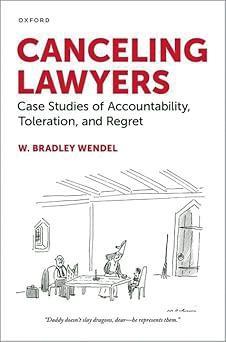Canceling Lawyers: Case Studies of Accountability, Toleration, and Regret
W. Bradley Wendel
£25.99, Oxford University Press
★★★★✩
Lawyers and law firms are not immune from the modern practice of ‘cancelling’ or publicly shaming. But should lawyers be held up to scorn, shunned, or made to suffer some social sanction for representing unpopular, controversial, or repugnant clients? As ever, a person’s view depends on their position, and whether a client is popular will affect the opinion of the observer. Immigration lawyers in the UK have been variously described as ‘lefty lawyers’ and ‘anti-British’ by certain Conservative politicians. During August’s street disturbances, some were warned by police to take extra security measures amid far-right threats to target their law firms. Prime minister Sir Keir Starmer has been criticised for his work as a barrister, when he assisted with the defence of criminals facing the death penalty in the Caribbean.
Canceling [sic] Lawyers explores the ethics of blame and its complex relationship to the rule of law. The independence of the judiciary is a fundamental component of the rule of law and, in democratic states, politicians tend to avoid personal attacks on judges when decisions do not go their way. However, while he was US president, Donald Trump displayed contempt for the authority of the courts and, by implication, for the rule of law itself. The infamous ‘Enemies of the People’ headline in the Daily Mail, relating to the 2016 ruling by the High Court in the Miller Article 50 case, was condemned by many members of the profession. However, although Liz Truss, then justice secretary, issued a statement defending the judiciary’s independence and impartiality, she did not condemn the headline.

A lawyer may have a variety of motivations for representing a client and an observer, who lacks the facts about the lawyer’s intentions and attitudes, imputes them based on the facts that are known. So is the court of public opinion a threat to the rule of law? Wendel suggests the principal objection by lawyers to social sanctions such as shaming or boycotting is that they ‘are not subject to the constraints of formal lawmaking and law application. There is no requirement that both sides be able to present evidence and have their arguments fairly considered. There are no constraints on what counts as admissible evidence. There is nothing comparable to the principle that like cases should be treated alike, or that sanctions be proportionate to the wrongdoing. One virtue of formal legal processes is also that those subject to legal sanctions perceive them as legitimate and thus deserving of respect’.
But Wendel also contends that lawyers should experience discomfort, qualms, or regret as an appropriate way of recognising the moral costs of what is otherwise a justified representation. In England and Wales, the SRA Principles include obligations on solicitors to uphold the rule of law and to act with independence and integrity. However, they do not require the client’s interests to come first – ‘should the principles come into conflict, those which safeguard the wider public interest (such as the rule of law and public confidence in a trustworthy solicitors’ profession and a safe and effective market for regulated legal services) take precedence over an individual client’s interests’. This priority, which may have surprised some lawyers, has been highlighted by the Horizon Inquiry’s examination of the conduct of lawyers who advised the Post Office.
Social media may appear to democratise justice by giving a voice to many, but there is a risk that the unregulated world of ‘shame and blame’ is being used as a form of social control. Wendel’s thought-provoking book is a timely and welcome contribution to a debate that is only getting started.
Kevin McVeigh is a partner at Elliott Duffy Garrett Solicitors, Belfast































No comments yet